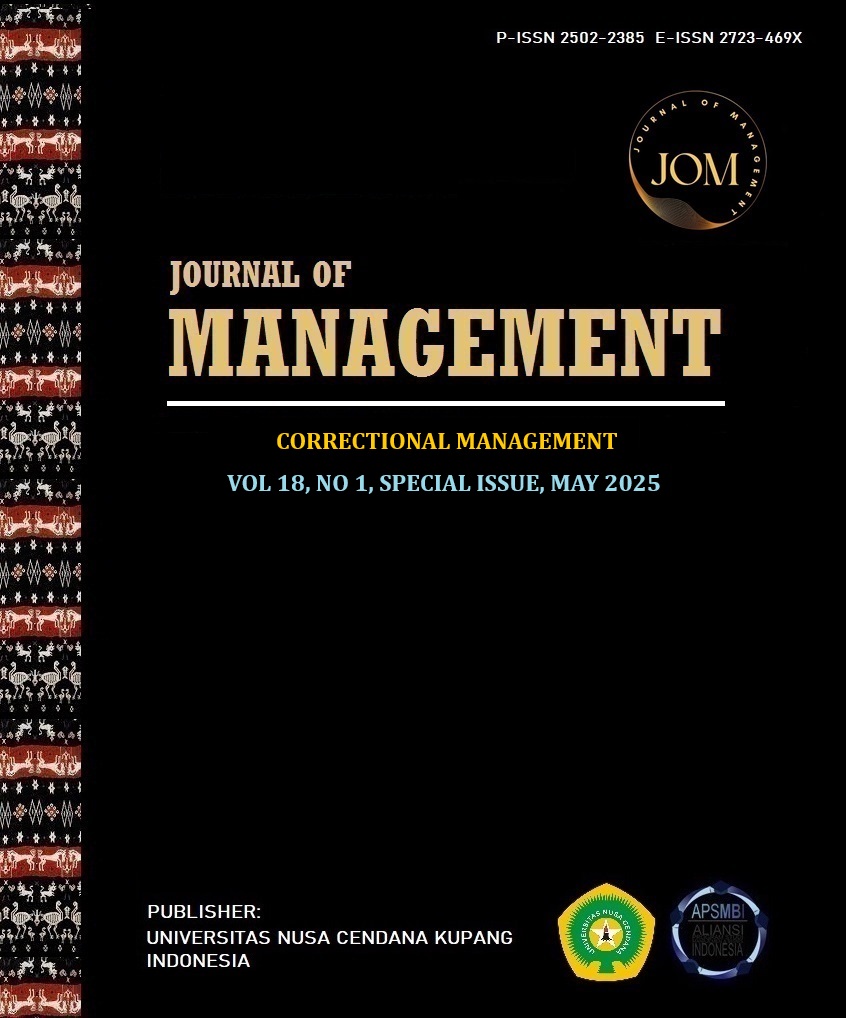THE INFLUENCE OF WORK MOTIVATION ON EMPLOYEE PERFORMANCE AT CLASS IIA BENGKULU CORRECTIONAL INSTITUTION
Abstract
This study aims to determine how work motivation affects employee performance at the Bengkulu Class IIA Correctional Institution. The research method used is a quantitative approach with data collection through questionnaires distributed to 89 employees. The data were analyzed using normality test, simple linear regression test, significance test, and determination test processed using IBM SPSS software version 25. The results showed that there is a significant positive influence between work motivation and employee performance. This finding indicates that increasing work motivation through various programs and policies that support it can improve employee performance in correctional institutions. This research is expected to provide insights for management in designing more effective strategies to improve employee motivation and performance in the institution.
Keywords: Work Motivation; Employee Performance; Class IIA Correctional Institution Bengkulu
Downloads
References
https://doi.org/10.1016/j.heliyon.2020.e04829
Chien, G. C. L., Mao, I., Nergui, E., & Chang, W. (2020a). The effect of work motivation on employee performance: Empirical evidence from 4-star hotels in Mongolia. Journal of Human Resources in Hospitality and Tourism, 19(4), 473–495. https://doi.org/10.1080/15332845.2020.1763766
Chien, G. C. L., Mao, I., Nergui, E., & Chang, W. (2020b). The effect of work motivation on employee performance: Empirical evidence from 4-star hotels in Mongolia. Journal of Human Resources in Hospitality and Tourism, 19(4), 473–495. https://doi.org/10.1080/15332845.2020.1763766
Crow, S. R., & Henning, J. A. (2021). Designing Lessons and Programs that Motivate Students. School Libraries Worldwide. https://doi.org/10.29173/slw8257
Deci, E. L., Ryan, R. M., Vallerand, R. J., & Pelletier, L. G. (1991). Motivation and Education: The Self-Determination Perspective. Educational Psychologist, 26(3–4). https://doi.org/10.1080/00461520.1991.9653137
Ilham, A. R. (2020). Sejarah Dan Perkembangan Konsep Kepenjaraan. Jurnal Kajian, Penelitian & Pengembangan Pendidikan Sejarah, 5(1).
Wahjono, S. I. (2022). Perkembangan Dan Sejarah Konsep Manajemen. Universitas Muhammadiyah Surabaya, April.
Ishtiaq, M. (2019). Book Review Creswell, J. W. (2014). Research Design: Qualitative, Quantitative and Mixed Methods Approaches (4th ed.). Thousand Oaks, CA: Sage. English Language Teaching, 12(5). https://doi.org/10.5539/elt.v12n5p40
Jasni, M. A., Abu Bakar Ah, S. H., Mohd Yusoff, J. Z., Md Shahid, K., & Omar, N. (2017). Konsep Residivisme : Kekaburan Definisi , Pengukuran dan Praktis. Akademika, 87(3).
Leonade. (2019). Teori Motivasi Abraham Maslow (Hierarki Kebutuhan). In Studi Manajemen.
Liaquat, M., Ahmed, G., Ismail, H., Ul Ain, Q., Irshad, S., Sadaf Izhar, S., & Tariq Mughal, M. (2024). Impact of motivational factors and green behaviors on employee environmental performance. Research in Globalization, 8.
https://doi.org/10.1016/j.resglo.2023.100180
Mee, J. F., & McFarland, D. E. (1959). Management Principles and Practices. Journal of Marketing, 23(4). https://doi.org/10.2307/1247430
Miskiani, K. A., & Bagia, I. W. (2020). Peningkatan Kinerja Karyawan melalui Motivasi Kerja Disiplin Kerja. Prospek: Jurnal Manajemen Dan Bisnis, 2(2).
Muhammad, M. (2021). Pelatihan Manajemen Sdm Dalam Meningkatkan Kualitas Sumber Daya Manusia (Sdm) Karyawan Di Universitas Malahayati Bandar Lampung. Community Development Journal : Jurnal Pengabdian Masyarakat, 2(2). https://doi.org/10.31004/cdj.v2i2.1769
Pargiani, P. (2019). Pengaruh Lingkungan Kerja Dan Penempatan Kerja Terhadap Semangat Kerja (Studi Pada Karyawan Bagian Produksi CV. Ghivella Wood Fortune Volatilitas.
Prasiwi, Y., Santoso, B., & Iriyanti, E. (2022). Pengaruh Motivasi dan Beban Kerja Terhadap Loyalitas Karyawan Melalui Kepuasan Kerja Karyawan Sebagai Variabel Intervening Pada PT. Wangta Agung Surabaya. Briliant: Jurnal Riset Dan Konseptual, 7(2). https://doi.org/10.28926/briliant.v7i2.878
Prayoga, A. dkk. (2023). Peran Lembaga Pemasyarakatan Dalam Sistem Peradilan Pidana Pada Proses Pembinaan Sebagai Tujuan Akhir Pemidanaan.
Reichenbach, A., Bringmann, A., Reader, E. E., Pournaras, C. J., Rungger-Brändle, E., Riva, C. E., Hardarson, S. H., Stefansson, E., Yard, W. N., Newman, E. A., & Holmes, D. (2019). fungsi dan tujuan motivasi. Progress in Retinal and Eye Research, 561(3).
Robbins, S. P., & Judge, T. A. (2008). Perilaku Organisasi, Edisi 12 Buku 1. In Jakarta: Salemba Empat.
Saputro, H. N. (2023). Inovasi Pelayanan pada Organisasi Publik. Jurnal Wacana Kinerja: Kajian Praktis-Akademis Kinerja Dan Administrasi Pelayanan Publik, 26(1). https://doi.org/10.31845/jwk.v26i1.823
Suarez-Barraza, M. F., & Miguel Davila, J. A. (2020). Exploring Fayol’s management process in a traditional Mayan dance (Pochó Dance): an ethnographic study. Asia-Pacific Journal of Business Administration, 13(2). https://doi.org/10.1108/APJBA-07-2020-0234
Wulan, M. T., Condro, H. D., & Triono, S. P. (2017). Pengaruh motivasi kerja, penggunaan teknologi informasi, dan kemampuan berkomunikasi interpersonal terhadap kinerja karyawan (Studi di Bank Rakyat In Surakarta: Fakultas Ekonomi dan Bisnis IAIN Surakarta.
Zakky. (2018). Pengertian Manajemen Menurut Para Ahli Secara Umum. In Zona Referensi.

 M. Ejo Pratama Ladico(1*)
M. Ejo Pratama Ladico(1*)



